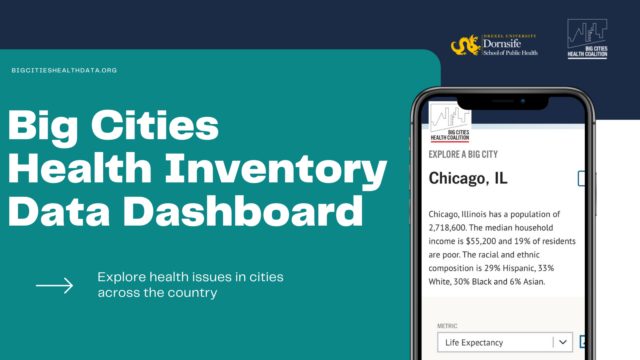Frontline Blog
Can’t-Miss Features in the Revamped Big Cities Health Inventory Data Platform
November 2021

Accurate, timely, and local data are essential to the practice of public health. In partnership with the Drexel Urban Health Collaborative (UHC), we have updated and redesigned our longstanding city data resource, the Big Cities Health Inventory (BCHI).
The BCHI provides a number of baseline metrics about health in urban communities and has the potential to provide evidence of policies and practices at work in member jurisdictions. The data platform allows for comparability across jurisdiction of data related to health and the social determinants of health—factors that affect the health of communities such as education, income, and housing.
The redesigned and updated data platform now contains more than 60,000 data points across more than 100 health, socio-economic, built environment, and demographic metrics.
Data from the platform can be used to help identify and share best practices across city health departments, as well as allow non-BCHC member cities to benchmark their cities’ data to others.
A few of the can’t-miss new features in the revamped data dashboard are below. We will be updating the data and features on a regular basis, so check back often.
More Metrics on Topics of Public Health Importance
The redesigned and updated data platform now contains more than 60,000 data points across more than 100 health, socio-economic, built environment, and demographic metrics. The topics covered by the data in the platform are broad and include: life expectancy and deaths, access to health services, chronic health diseases, infectious diseases, maternal and child health, mental health and substance use, poisoning, violence and injury, social and economic factors, physical and built environment, and demographics.
Data at the City Level
Many data portals provide national, state, or county-level data. BCHI primarily displays trends at the city level. It is vital that health departments and policy makers are able to assess the needs and issues that their residents face along appropriate political jurisdictional lines. For example, if a city health department advising a mayor on health trends related to a particular policy, having data at the county level are not helpful. Likewise, if cities want to benchmark themselves, they want to do so compared to other cities, not counties. City-level data are also needed in order to document city-level health inequities and inform health policies and priorities. This resource can be used at all levels of government, by city stakeholders, researchers, or simply by data viz nerds.
Enhanced Visualization of Trends Over Time
Effective public health practice and policymaking depends on having reliable and timely health information. The Drexel Urban Health Collaborative team has updated the data platform to reflect data from 2010-2019 thus enabling visualization of data trends over time.
Easy to Use, Download and Share
This data can be used in a variety of settings – however it may fit one’s needs! It features downloadable and shareable charts and data points. Additionally, the entire dataset is available for download as a .csv file. This data can be analyzed to inform public health programs, used for dissertation or thesis research, or for grant applications, among other things.
* * *
The BCHI has a long history of being driven by city-level epidemiologists, originally as a book of Excel spreadsheets, and now, 15 years later, as an online resource. we launched the first iteration of the online platform in 2016 with funding from CDC. In 2019, we entered into a partnership with the Drexel UHC to manage this work for us and our members. The platform is primarily supported by the U.S. Centers for Disease Control and Prevention through their cooperative agreement (5U38OT000172-03) with the National Association of County and City Health Officials (NACCHO). We thank these organizations and the Coalition’s other funders and partners, for their support of this work. Note that views related to the data do not necessarily reflect the views of the funders.
To learn more about the new and enhanced Big Cities Health Inventory Data Platform, visit the site at bigcitieshealthdata.org.